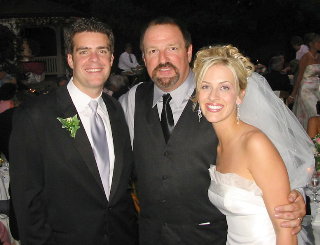
Become A Hero To LB Animals With A $20 Membership. Learn About Us, Click Here.

Saving Lives Thru Spay/Neuter & Education


3853 Atlantic Ave.
CA Senate Passes (September 2, 2005) -- On September 1, 2005, the CA State Senate voted 21-15 [21 votes needed for passage] in favor of legislation authorizing The legislation returned when its author, Assemblyman Mark Leno (D., SF), used a procedure (commonly called "gut and amend") that takes a bill on an entirely different subject (in this case, one dealing with fish and game & marine research) that previously cleared legislative committees, remove its text and substitute the gender-neutral marriage text. The measure was carried in the State Senate by Sen. Shiela Kuehl (D., Santa Monica). Among the bill's Assembly The Senate debate took place in a markedly solemn tone of voice on both sides. The vote made national/international news. Reuters coverage, click here. Among the most intense floor statements was that of State Senator Alan Lowenthal (D., LB-Sp-PV). We post it verbatim below. We also post the "aye" and "no" votes of State Senators on the measure. Assembly action on the bill, now designated AB 849 (text below), could take place in the coming week. State Sen. Alan Lowenthal: I rise in support of Assembly Bill 849. I do this for both personal and also policy issues.'I'm very proud today to be a member of this institution, to be part of this debate. It will always be something that I remember as one of the most important days of my life really. On a personal level, I just want to say that I remember growing up -- I was a child in the second world war -- and I remember growing up and being in fights right after the second world war where people would pick on me, I thought, because I was Jewish. And I said I'm just the same as you, why do you pick on me? Well, they said, you caused the death of my brother, or my uncle, or you were there, we had to go to war because of you or people like you. And I remembered in the 60s when I joined the civil rights movement, seeing the tremendous inhumane treatment of my brothers and sisters, of my friends who were Black primarily, and I did not understand the tremendous inhumanity and I felt compelled to participate in that struggle. And today for my own personal growth, I feel compelled to participate in this struggle. But I also want to say a few things about the policy level, and to really look at some of the underlying assumptions that those that oppose marriage between two [same gender] persons, and to really indicate that there really are errors in these assumptions. One is that somehow marriage between a man and a woman is somehow equated with family, that somehow nurturance and love and acceptance and support and security is related to one's gender rather than the quality of the relationship. That is totally false. It's the quality of our relationships. Two, that the best chance, I heard today, is when children grow up in a family with a man and a woman. Who are we talking about? Are we really talking about those children, or are we really talking about ourselves who will not treat children from families, of diverse families, with the same respect? That really is an indictment of ourselves and those that discriminate, not those families, that's what we're talking about. And the third one is, that it is more natural, I hear that all the time, to be from a heterosexual family, that somehow we have equated what is natural with frequency of occurrence. If that it is so, if that's really what natural is, our society and the human species is doomed, because we cannot really move forward as a species, as a people, as a family, if we do not accept all variations as natural, and just that what is frequency of occurence is the most natural will never allow us to change, if we then have to exterminate, really, or eliminate all that are not in the most frequent. That is not who we are as a people and how we have evolved till today. So for those reasons, because what we're talking about today, marriage between two people, really does embody family, it is natural, and it really will be if we all embrace as the best chance, if we really provide and promote relationships really, I strongly stand here and support AB 849. It is the right thing to do, both policy, and it is the right thing for me to stand and join with my colleagues. Thank you. LBReport.com posts the recorded Senate vote below. VOTES - ROLL CALL MEASURE: AB 849 AUTHOR: Leno TOPIC: Gender-neutral marriage. DATE: 09/01/2005 LOCATION: SEN. FLOOR MOTION: Assembly 3rd Reading AB849 Leno By Kuehl (AYES 21. NOES 15.) (PASS) AYES **** Alarcon Alquist Bowen Cedillo Chesbro Dunn Escutia Figueroa Kehoe Kuehl Lowenthal Migden Murray Ortiz Perata Romero Simitian Soto Speier Torlakson Vincent NOES **** Aanestad Ackerman Ashburn Battin Campbell Cox Denham Dutton Florez Hollingsworth Maldonado Margett McClintock Poochigian Runner ABSENT, ABSTAINING, OR NOT VOTING ********************************* Ducheny Machado Morrow ScottBelow is the text of AB 849 as approved in the CA Senate on Sept. 1: BILL NUMBER: AB 849 AMENDED BILL TEXT AMENDED IN SENATE JUNE 28, 2005 INTRODUCED BY Assembly Below is the legislative analysis that accompanied the bill: BILL ANALYSIS AB 849 CONCURRENCE IN SENATE AMENDMENTS AB 849 (Leno) As Amended June 28, 2005 Majority vote ... SUMMARY : Seeks to end the state's denial of marriage licenses to same-sex couples in California. Specifically, this bill : 1)Eliminates the current "different-gender" requirement in the state's definition of marriage. 2)Clarifies that gender-specific terms in the state's family laws shall be construed to be gender-neutral, except in regards to Family Code Section 308.5, concerning recognition of marriages contracted in other jurisdictions (Proposition 22 of 2000). 3)Adds Section 403 to the Family Code to declare that no religious official shall be required to perform or solemnize any marriage in violation of his or her religious conviction. 4)Includes findings that Family Code Sections 300 and 308.5 have been declared unconstitutional in coordinated state-court proceedings and that the bill does not amend Family Code Section 308.5 to the extent that Section 308.5 addresses only marriages from other jurisdictions. 5)Acknowledges the authority of the California Supreme Court to make a final judicial determination regarding Section 308.5's meaning, and validity or invalidity. The Senate amendments delete the Assembly version of this bill and insert the provisions summarized above. EXISTING LAW: 1)Provides that "Marriage is a personal relation arising out of a civil contract between a man and a woman, to which the consent of the parties capable of making that contract is necessary." (Family Code Section 300. All further references are to this code unless otherwise noted.) 2)Provides that "A marriage contracted outside this state that would be valid by the laws of the jurisdiction in which the marriage was contracted is valid in this state." (Family Code Section 308.) 3)Provides, immediately following Section 308 that "Only marriage between a man and a woman is valid or recognized in California." (Family Code Section 308.5.) 4)Provides, in the state's Equal Protection Clause, in Article I, Section 7, that: (a) "A person may not be deprived of life, liberty, or property without due process of law or denied equal protection of the laws. . . " and (b) "A citizen or class of citizens may not be granted privileges or immunities not granted on the same terms to all citizens." AS PASSED BY THE ASSEMBLY , this bill dealt with fish and game. FISCAL EFFECT : According to the Senate Appropriations analysis, the Franchise Tax Board (FTB) in 2004 estimated a state personal income tax revenue loss of about $1 million for every 4,900 same-sex couples whose filing status would change. These couples would have a change in state filing status to married filing joint or married filing separate. The 2000 census identified 92,138 same-sex couples living in California (as of May 1, 2005, there were 27,300 registered domestic partnerships in California, the majority of which are same-sex couples). In less than a month last year, over 4,000 same-sex couples were married in San Francisco. Assuming one-half of the existing registered domestic partners marry within the first year, revenue loss for fiscal year 2006-07 and each year thereafter would be $3 million. The actual number of marriages could be significantly greater. The 2000 census also found that 92% of cohabitating heterosexual couples were married. If a similar pattern occurred with same sex couples, actual losses probably would be significantly greater. In addition, there would be a minor revenue increases from marriage license fees and unquantifiable increased economic activity surrounding more weddings in the state. Offsetting savings could occur from reduced eligibility for Medi-Cal and SSI/SSP, but these savings would accrue only if federal law changes or eligibility waivers were granted. COMMENTS : This legislation seeks to halt the state's practice of denying same-sex couples the right to marry by defining marriage as between "two persons" instead of solely between a man and a woman. The bill thus raises important questions of law and public policy that are now being discussed across the nation and around the world, reflecting one of this nation's most significant civil rights issues for the 21st century. The issue of legal recognition of same-sex couples in California dates back two decades. Before the 1980s, same-sex couples had no legal recognition in California - or virtually anywhere else. As families, same-sex couples were essentially invisible to the law. In 1984, however, the City of Berkeley extended employee benefits to the same-sex partners of municipal employees, and in 1985 West Hollywood became the first governmental entity to offer legal recognition to same-sex couples among the general public by establishing a legal status called "domestic partnership." By 2000, 18 California local governments had established domestic partnership registries. California took notice of this emerging movement. In 1999, the Legislature enacted AB 26 (Migden) to create the state's first domestic partnership statute. This statute, which forms the backbone of California's domestic partnership law, provided for domestic partnerships to be registered with the Secretary of State, for public employers to offer health benefits to domestic partners, and for domestic partners to have hospital visitation rights. The most comprehensive set of rights and responsibilities for registered domestic partners was enacted in 2003 by AB 205 (Goldberg). That bill became fully operative this past January 1, 2005, and it has been upheld by the courts against challengers' arguments that granting legal protections to same-sex couples is inconsistent with Proposition 22. Even so, the domestic partner laws do not provide many rights possessed under our marriage laws. For example, they preclude joint filing of income taxes, fail to treat earned income as community property for state income tax purposes, and deny access to certain long-term care benefits. In addition, domestic partners are denied the protections available under more than 1,100 federal statutes relating to marriage. The federal benefits afforded to opposite-sex, married couples include such basic benefits as social security, Medicare, federal housing assistance, food stamps, veterans' benefits, military benefits, tax benefits and federal employment benefits. In 1996 Congress passed, and President Clinton signed, the federal Defense of Marriage Act (DOMA), which among other things says that no state is required under federal law to give effect to same-sex marriages contracted in other states. In light of the federal DOMA, other states have also enacted measures prohibiting recognition of marriages entered into by same-sex couples in other jurisdictions. Some states have gone so far as to enact into their constitutions provisions that purport to prohibit recognition of relationships between same-sex couples other than marriage, such as domestic partnerships or civil unions. In 2000, a group of citizens led by the late state senator Pete Knight placed Proposition 22 on the March 2000 ballot to prohibit California from recognizing any same-sex marriages contracted in other states or countries. The measure passed with 61% of the vote and became codified as Family Code Section 308.5. However, a superior court judge has recently entered a judgment declaring Proposition 22 invalid under the state Constitution. The Massachusetts Supreme Judicial Court in November 2003 and February 2004 ruled the Massachusetts definition of marriage violated that state's constitutional equal protection provisions. In response to this advisory opinion, the state legalized same-sex marriage and began issuing marriage licenses to same-sex couples on May 17, 2004. In February 2004, the City and County of San Francisco began issuing marriage licenses to same-sex couples. On August 12, 2004, the California Supreme Court unanimously ruled that San Francisco officials exceeded their authority in issuing the licenses because it is the role of the courts, not local officials, to determine the constitutionality of the state's marriage laws. By a 5-2 vote, the court also invalidated the 4,037 marriages that had taken place in San Francisco. The court did not rule on the constitutionality of the state's statutory prohibition of marriage by same-sex couples. Rather, an order filed by the Court in March 2004 expressly invited the filing of a lawsuit in superior court to address this very issue. Then, just this past March 14, 2005, the San Francisco Superior Court concluded that same-sex couples are denied equal protection by marriage laws that prohibit them from marrying. The trial court held that California's exclusion of same-sex couples from marriage constitutes discrimination on the basis of gender and interferes with the fundamental right to marry the person of one's choosing. A major legal question presented by this legislation is whether it conflicts with Proposition 22. The answer to this question depends upon how broadly the proposition is read. Under a more narrow reading, Proposition 22 applies only to marriages contracted out of state-that is, it simply prevents California from recognizing marriages between same-sex couples entered into outside California. Under a more broad reading, Proposition 22 prohibits marriages between same-sex couples whether performed inside or outside of the state. Regardless of Proposition 22's reach, Family Code Sections 300 and 308.5 raise critical constitutional questions. Indeed, the superior court in San Francisco in the coordinated marriage cases has recently declared both statutes unconstitutional. Three points were important to the court's constitutional analysis. First, the history of California's definition of marriage clearly shows an explicit intent to discriminate against lesbians and gay men and to exclude same-sex couples from marriage. Second, there are two landmark rulings from the California Supreme Court that bear directly on the question of the constitutionality of a definition that excludes same-sex couples, and suggest that California's current statute banning same-sex marriage may likely be struck down if the issue is heard by the State Supreme Court. And third, there is an undeniably strong trend in rulings from other state supreme courts, and from the U.S. Supreme Court itself, suggesting that the statute likely could not, and ultimately will not, withstand constitutional scrutiny. The California Constitution contains two independent equal protection provisions. For nearly three decades, the California courts have held that the equal protection clause protects gay and lesbian persons. In the landmark decision of Gay Law Students v. Pacific Telephone and Telegraph (1977), the California Supreme Court expressly held that subdivision (a) of Article I, section 7 guarantees lesbians and gay men, as a class, equal protection. In 1948, California's Supreme Court was the first in the nation to hold that a law prohibiting persons from marrying outside their race violated the constitution. Perez v. Lippold (1948) preceded the U.S. Supreme Court's decision in Loving v. Virginia (1967) on the same question by nearly 20 years. Given the fundamental nature of the right to marry, the Court held that any infringement of that right "must be based upon more than prejudice and must be free from oppressive discrimination to comply with the constitutional requirements of due process and equal protection of the laws." More, importantly the Court held that while the state has authority to prohibit marriage between specific individuals when there is a legitimate state concern, such legislation would have to be specific to the individuals in question, and could not use "arbitrary classifications of groups or races" as a substitute. (Emphasis added.) Three state supreme courts have addressed the question of whether a state law that defines marriage so as to exclude same sex partners violates their respective state constitutions. Importantly, in each case, the court has ruled in favor of the same-sex couples. Finally, two cases from the U.S. Supreme Court decided by 6-3 majorities, have recently addressed issues relevant to the pending bill. In Romer v. Evans (1996) the Court overturned Colorado's Amendment 2, which would have amended the Colorado Constitution to exclude lesbians and gay men from obtaining legal protection. More recently, in Lawrence v. Texas (2003), the U.S. Supreme Court struck down a state homosexual sodomy law on the ground that the "liberty" protected by the Fourteenth Amendment includes private, consensual adult sexual relations. The Court did not need to decide whether gay men and lesbians have a constitutional right to marry, and the Court expressly left that question open. So far, no state high court has found adequate justification under state law for treating homosexual couples differently than heterosexual couples in defining marriage, even under a constitutionally lenient "rational basis" test. This appears to be where California's courts ultimately may arrive, as the trial court opinion in the coordinated marriage cases demonstrates. Contact us: mail@LBReport.com |
     
|